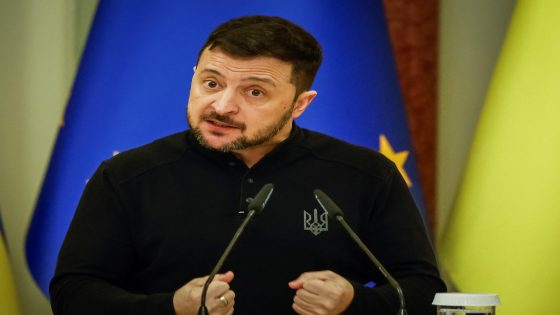President Volodymyr Zelenskyy said over the weekend that he seeks an early end to the war with Russia, adding Ukraine could retake occupied land later through diplomacy if Kyiv’s NATO membership is certain.
This marks a shift from his earlier stance, where he said the end of the war was contingent on Russia returning seized Ukrainian territory.
So why has Zelenskyy shifted his stance, and what’s next?
What did Zelenskyy say about ending the Ukraine war?
In an interview with Sky News chief correspondent Stuart Ramsay, published on November 29, Zelenskyy said the “hot phase” of the war could end if NATO offered security guarantees for the part of Ukraine currently under Kyiv’s control.
He said the return of land occupied by Russia at the moment could be diplomatically negotiated later. The Ukrainian leader reiterated this stance in an interview published by the Japanese news agency Kyodo News on Monday.
“If we want to stop the hot phase of the war, we need to take under the NATO umbrella the territory of Ukraine that we have under our control,” he told Sky News.
“We need to do it fast. And then on the [occupied] territory of Ukraine, Ukraine can get them back in a diplomatic way,” he said.
He told Sky News that the ceasefire needs to guarantee that Russian President Vladimir Putin does not return to take more territory.
Russia has taken about 20 percent of Ukrainian territory since 2014. This includes Crimea, which Russia annexed in 2014.
Since February 2022, when Putin launched the full-fledged invasion of Ukraine, Russia has taken over large chunks of Donetsk, Kherson, Luhansk and Zaporizhia, and announced the annexation of these regions in September 2022.
Has Zelenskyy’s position on ending the war shifted?
Yes. Zelenskyy’s recent interviews mark the first time he has laid out a plan for the end of the war that does not involve Russia returning seized territory to Ukraine as a condition.
“This is a major compromise by Zelenskyy over territory for sure, but I think it reflects the harsh reality,” Timothy Ash, an associate fellow in the Russia and Eurasia programme at Chatham House, a London-based think tank, told Al Jazeera.
Before this, Zelenskyy had stressed that a peace deal would not go through unless Russia’s annexation of Ukrainian territories was nullified.
In July, he told French outlet Le Monde that the seized territories could join Russia if they voted to do so in a free and fair referendum. However, to conduct this referendum, Ukraine would need to regain hold of these territories.
Why has Zelenskyy changed his plan?
Zelenskyy made a rare admission to Kyodo News that it would be difficult for the Ukrainian army to retake land grabbed by Russia through military means.
“Our army lacks the strength to do that. That is true,” he said. “We do have to find diplomatic solutions.”
His statements also come soon after Republican leader Donald Trump won the United States election last month. Trump’s election marks a shift in the US approach towards Ukraine.
The US under President Joe Biden has been the largest provider of military aid to Ukraine. According to the US State Department, Washington has provided $64bn in military aid to Ukraine since February 2022.
The US has provided Ukraine with high-precision weapons like the ATACM long-range missiles but allowed it to use them on Russian targets only recently.
While Trump’s peace plan for Ukraine is vague, there are fears in Kyiv that he would cut back aid — or even stop it altogether. Without US aid, Ukrainian forces would struggle to fight a rapidly intensifying war, according to analysts. Besides an exchange of drone strikes, Russian troops have been capturing villages in Ukraine’s east amid efforts to capture the industrial Donbas region.
Additionally, Russian forces have been bolstered by North Korean troops who have joined the war front, Ukraine, the US and South Korea say.
What does Zelenskyy want?
Zelenskyy told Sky News that he wants to work and communicate directly with Trump, describing their September meeting as “warm, good, constructive”.
Researcher Ash said the critical issue for Ukraine is that any peace deal should secure the territory that does remain under Kyiv’s control. “If not, Putin would see the opportunity to invade again at a later date.”
Public opinion in Ukraine is also shifting. More and more Ukrainians are keen for a prompt end to the war, rather than an all-out victory.
According to a Gallup poll released on November 19, 52 percent of Ukrainians would like the war to end “as soon as possible”, even if it involves conceding territory. A mere 38 percent want Ukraine to “fight until victory” – a dramatic drop compared with 73 percent in 2022.
What is the status of Ukraine’s NATO membership bid?
Ukraine has been pressing for NATO membership with increasing urgency in recent months. Membership in the military alliance is a key part of Zelenskyy’s “peace plan”.
On Sunday, he called on the outgoing Biden administration to convince NATO allies to invite Ukraine into the alliance during a NATO meeting in Brussels this week.
NATO members have assured Ukraine that it is on an “irreversible” path to membership.
However, NATO allies are sceptical of admitting Ukraine while it is at war with Russia. This is because Ukraine being part of NATO would immediately mean that the alliance as a whole would be at war with Russia.
US Vice President-elect JD Vance spelled out some details of Trump’s potential plan to end the Ukraine war, in an interview for the Shawn Ryan Show, which was released in September. Vance said the plan involved Russia receiving “the guarantee of neutrality from Ukraine”, where Kyiv does not join NATO.
Trump’s newly nominated special envoy for the Russia-Ukraine war, Keith Kellogg, wrote in April, that NATO leaders should offer to hold off Ukraine’s membership to convince Putin to participate in peace talks.





